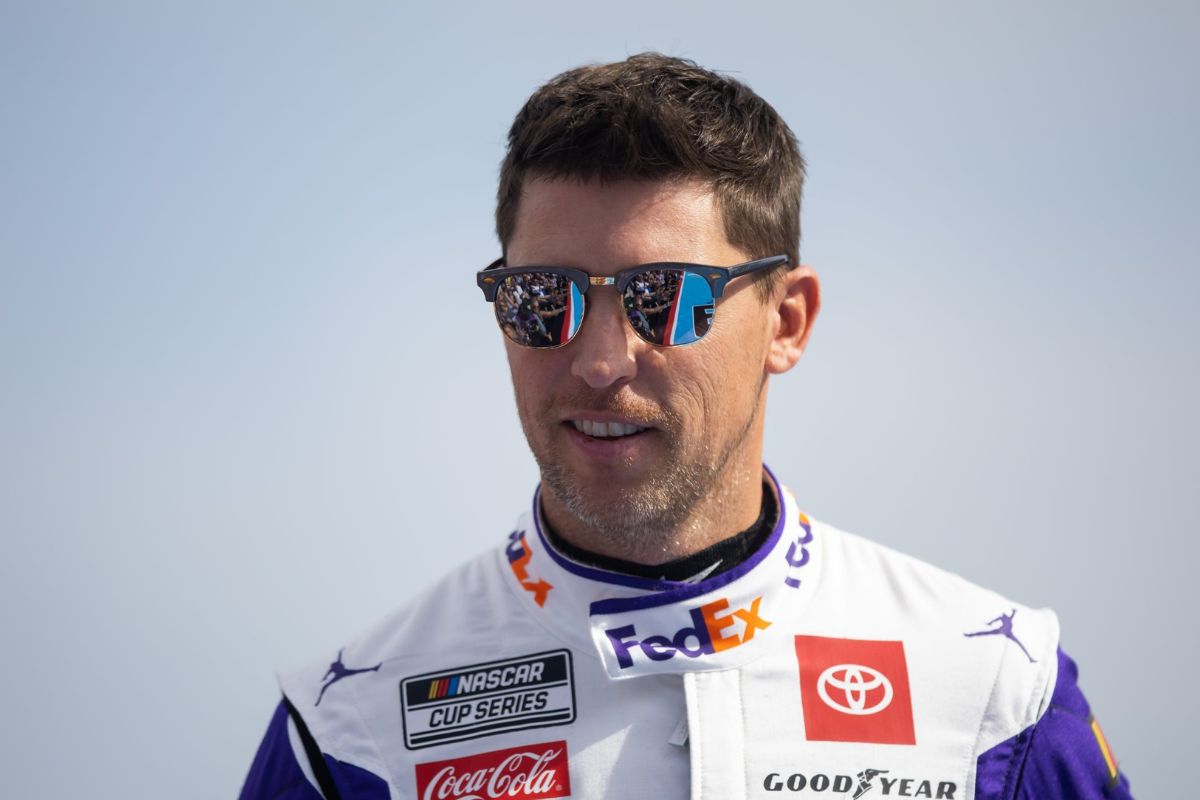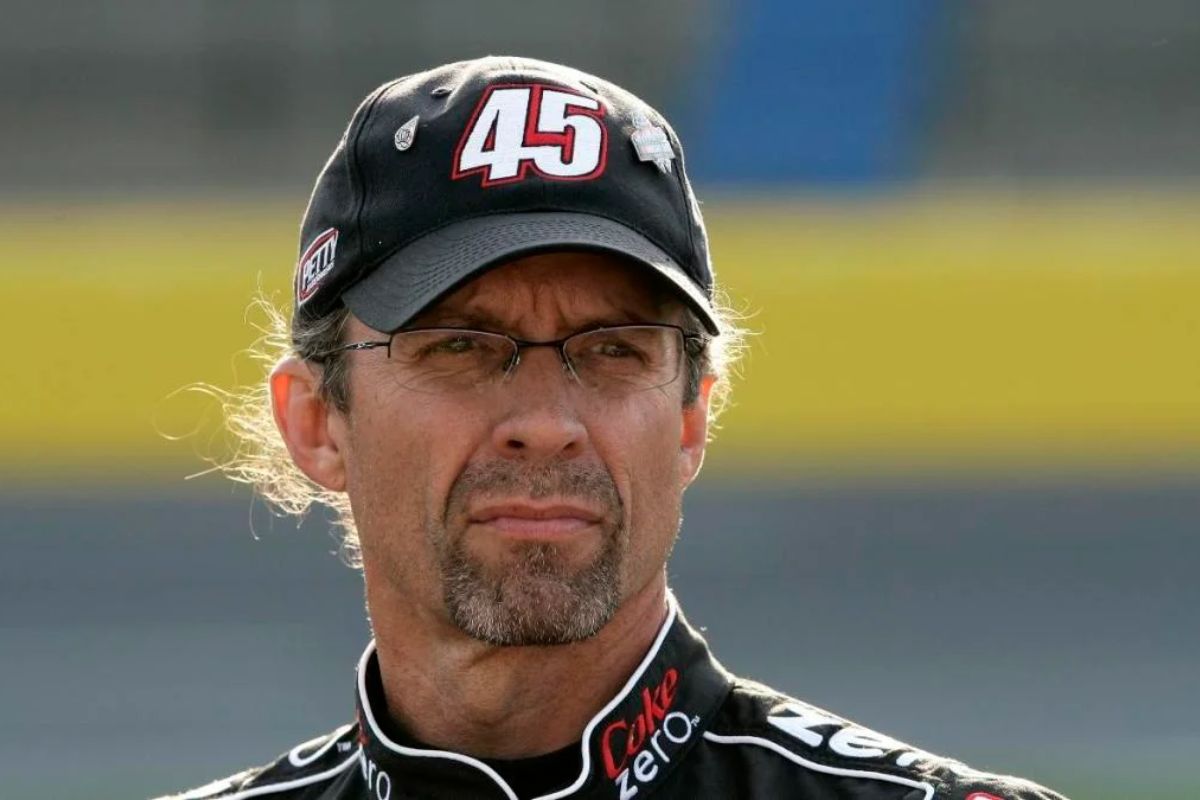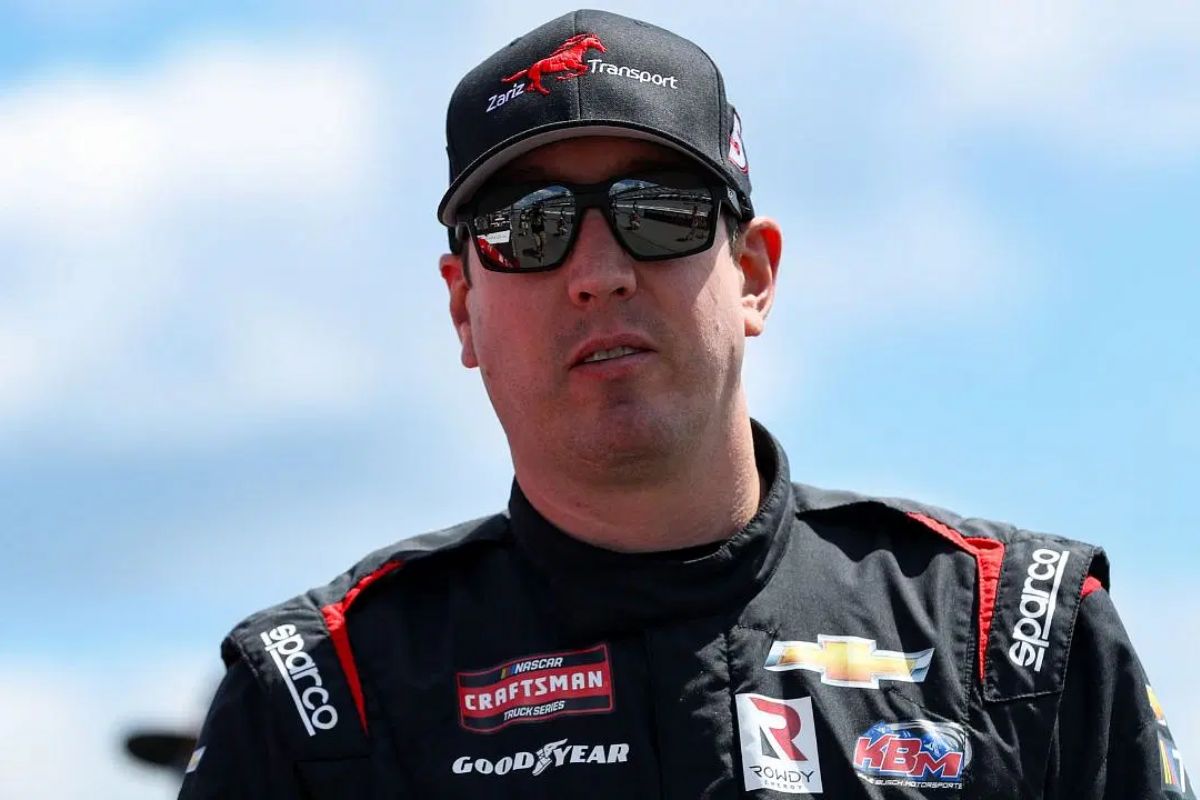Kyle Petty Ignores Kyle Busch: In NASCAR, where every accolade counts, Kyle Petty’s recent commendation of Denny Hamlin’s achievements without mentioning Kyle Busch has sparked intrigue. Busch, a formidable competitor with a substantial track record, has been conspicuously left out of Petty’s narrative. This selective praise prompts us to ponder the underlying factors at play: Could there be an overlooked rivalry, or is it merely an oversight? Such a discernment not only alters our perception of Hamlin’s accomplishments but also starts a deeper exploration into what shapes legends in NASCAR.
Key Takeaways
- Kyle Petty focused on Denny Hamlin’s achievements, equating him with his grandfather, Lee Petty.
- Petty’s commentary highlighted Hamlin’s strategic skills and clutch performances.
- Kyle Busch, with 63 wins, was notably absent from Petty’s praises despite his accomplishments.
- The exclusion could suggest a narrative shift or oversight in NASCAR discussions.
- This omission may influence public perception, spotlighting Hamlin while overshadowing Busch’s current struggles.
Denny Hamlin’s Remarkable Climb
Denny Hamlin’s rise in the NASCAR ranks is marked by his recent victory at Dover, where he equaled Lee Petty’s record of 54 career wins, positioning him near the pinnacle of racing legends. He now has as many wins as the 12th person on the list of most wins in the Cup Series ever. This milestone not only boosts Hamlin’s standing in the records of NASCAR history but also shows his consistent performance and resilience in the face of intense competition. Despite not securing a Cup championship, Hamlin’s ability to secure wins at this prolific rate highlights a remarkable consistency and skill set that distinguishes him from many of his competitors.
Moreover, Hamlin’s path reflects a broader narrative within NASCAR, where perseverance and longevity yield historical recognition. His pursuit of Rusty Wallace’s 55-win mark is not merely a personal milestone but a demonstration of sustained excellence in a highly competitive sport. As Hamlin approaches this next milestone, his career serves as a compelling case study in how talent, when coupled with determination and strategic foresight, can achieve enduring success in motorsports.
Kyle Busch’s Stint and Silence
Kyle Busch, despite his impressive record of 63 career wins, has recently faced a noticeable dip in performance, leading to a period of relative silence in the media compared to the accolades directed at his peers. This recent downturn marks a significant phase in Busch’s career, highlighted by a contrast in media attention, especially when compared to the coverage of Denny Hamlin’s successes. Currently positioned at 9th place of most career wins, Busch’s struggles on the track have not gone unnoticed, raising questions about the potential factors contributing to this slump.
Historically, fluctuations in a driver’s performance can be attributed to a variety of factors including team dynamics, vehicle adjustments, and personal adaptability to the evolving nature of the sport. For an elite driver like Busch, known for his aggressive driving style and strategic skills, this phase could either be a temporary setback or a critical period that might define his subsequent strategies and achievements in NASCAR.
Kyle Petty’s Praise for Hamlin
In a recent accolade-filled commentary, Kyle Petty praised Denny Hamlin’s achievement of joining the prestigious circle of NASCAR drivers with over 54 career wins. Petty’s praise for Hamlin was not just about acknowledging a milestone but recognizing the depth of talent and strategic skills that Hamlin has brought to NASCAR over the years.
- Historical Significance: Hamlin’s achievement places him alongside legendary figures like Lee Petty, Kyle’s grandfather. Being one of only 12 drivers to have ever reached or surpassed 54 wins marks a significant historical milestone in the sport.
“Denny Hamlin ties my grandfather Lee Petty at 54 wins. That is huge people that is huge. Only 12 guys in the history of the sport have ever climbed that 54 mountain and Denny Hamlin is one of them. Denny is that guy that came into the sport that had tons of talent and Tons of Speed but that’s all he had: talent and speed. He’s taken that speed, he’s corralled after all these years and he’s taken that talent and he’s become that guy that has that magic bag of tricks. He can start anywhere anytime and make something happen in those last five or six laps of the race.” – (Kyle Petty)
- Innate Talent: Kyle emphasized Hamlin’s natural ability, noting his ‘tons of talent and speed.’ This intrinsic skill set has been a foundational element of Hamlin’s success, distinguishing him in a highly competitive field.
- Evolution as a Competitor: Over his career, Hamlin has not only relied on his raw speed and talent but has also developed a strategic approach to racing. Kyle noted how Hamlin has ‘harnessed’ his abilities to optimize performance, especially in critical moments of races.
- Clutch Performance: Perhaps most importantly, Petty praised Hamlin’s ability to making pivotal moves in the closing laps of a race. This ability to alter the outcome in the final moments is a reflection of Hamlin’s racing intelligence and his ‘bag of tricks.’
“He will go down in history as one of the greatest drivers. His peers as we look at the guys who started at the same time he did Martin Truex the same year. He has 20 more wins than Martin Truex. When we look at guys like Kyle Larson and Joey Logano he has 20 more wins than these guys. He is the class of this generation. Believe me, he’ll be a top 10 guy.” – (Kyle Petty)
The Missing Mention of Kyle Busch
Despite Kyle Petty’s extensive accolades for Denny Hamlin, his omission of Kyle Busch, a prominent figure with 63 career wins, stands out as a notable exclusion. This oversight is particularly striking given Busch’s significant accomplishments and status as the leading active driver in terms of race victories. The absence of any mention of Busch not only skews the narrative around NASCAR’s current competitive landscape but also diminishes the recognition of Busch’s substantial contributions to the sport.
Analyzing Petty’s commentary, one might speculate whether the exclusion was a mere oversight or a deliberate choice. The decision to not acknowledge Busch, intentionally or not, shifts the focus solely onto Hamlin, perhaps to emphasize a specific narrative or perspective that Petty wished to convey. This approach can be seen as an effort to promote Hamlin’s achievements without the comparative context that including Busch would provide.
|
Driver |
Career Wins |
| Kyle Busch | 63 |
| Denny Hamlin | 54 |
| Kevin Harvick | 60 |
| Rusty Wallace | 55 |
| Richard Petty | 200 |
Hamlin’s Reflections and Goals
Denny Hamlin’s candid reflections reveal a deep-seated ambition to etch his name among NASCAR’s elite race winners. His reflections after races often touch on a mixture of disbelief and determination as he views his career achievements in the context of NASCAR legends. Despite his success, Hamlin remains focused on what he perceives as missed opportunities and the elusive wins that keep him hungry for more.
“It doesn’t seem right,” Hamlin said “If you put all the names on the list in the orders of the wins that they have, I don’t know, I see my name as just an outlier, one that sticks out like it doesn’t really belong there. I’ve been doing it for a long time. You take for granted all the wins that you’ve had. All we think about is the ones that we didn’t win. I’m like, man, I feel like I should have 80 or 90, realistically.”
- Recognition Among Legends: Hamlin is acutely aware of his standings on the all-time wins list. His goal is not just to increase his number of wins, but to solidify his place among the iconic figures of NASCAR.
- Achieving a Personal Win Threshold: He has set a personal target to reach a win total that unequivocally places him within the top 10 race winners in NASCAR history. This number is not just a marker of success but a milestone that, once reached, will redefine his legacy.
- Overcoming the Championship Hurdle: Despite numerous wins, a Cup Series championship has eluded Hamlin. This remains a pivotal objective that would validate his career and possibly alter his own perception of his achievements.
- Changing the Narrative: Hamlin seeks to shift the focus from the races he hasn’t won to a celebration of the victories he has secured. This psychological shift is vital for his continued success and legacy in the sport.
“But everyone has those stories. It’s my personal goal, in my career I want to get to a number that puts me well inside that top 10 of race winners. I think that will speak for itself and the resume.” – (Hamlin)
News in Brief: Kyle Petty Ignores Kyle Busch
The omission of Kyle Busch in Kyle Petty’s commendations of Denny Hamlin highlights a significant oversight in the narrative surrounding NASCAR’s competitive dynamics. This exclusion not only distorts the historical context but also diminishes the recognition of Busch’s substantial contributions to the sport.
A more comprehensive acknowledgment would enrich the understanding of NASCAR’s evolution and the interplay of its key competitors, ensuring a balanced portrayal of its most influential figures and their achievements in NASCAR.
Our Reader’s Queries
Q. When did Kyle Petty quit racing?
A. Kyle Petty hung up his NASCAR racing gloves in 2008, finding solace in Matthews. Since then, he’s been weaving his insights into the sport as a race analyst, lending his expertise to various networks. Presently, he’s settled into his role at NBC Sports, adding his seasoned perspective to the broadcast team.
Q. Did Kyle Petty lose his son?
A. In the realm of American sports, NASCAR stands tall, captivating millions, with the Pettys reigning as a household name. Yet, in May 2000, tragedy struck as 19-year-old Adam Petty’s promising career was cut short. A harrowing moment unfolded when his throttle jammed, propelling his car into the unforgiving embrace of the track’s outer wall.
Q. Why did Kyle Petty retire?
A. In 2001, Adam Petty blazed onto the Winston Cup scene, proudly donning the No. 45 and steering into a new era with Dodge, a move mirrored by the entire Petty Enterprises clan. However, amidst this transition, Kyle Petty’s dwindling fortunes cast a shadow, leading to his decision to bid farewell to the racing world after the 2003 season.
ALSO READ: Kyle Petty Praises Tyler Reddick: A Jordan-Esque Performance



